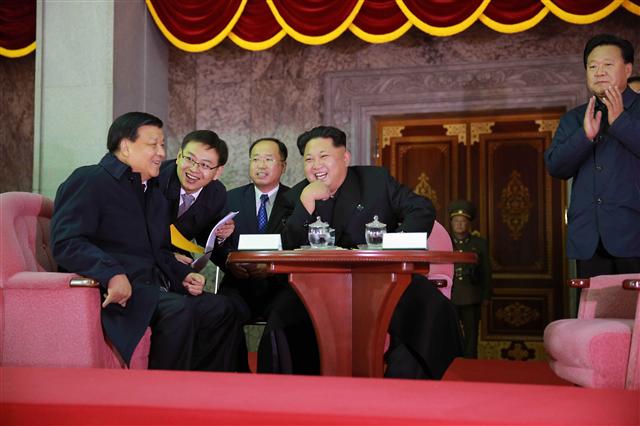Posted on : Oct.13,2015 18:10 KSTModified on : Oct.13,2015 18:10 KST
 |
North Korean leader Kim Jong-un (seated, far right) talks with Liu Yunshan, the Chinese Communist Party politburo standing committee member at the event in Pyongyang to celebrate the seventieth anniversary of the Korean Workers’ Party, Oct. 10. (KNCA/Yonhap News) |
Two leaders need to craft a response to Pyongyang’s lack of rocket launch and apparent rapprochement with China
An upcoming South Korea-US summit in Washington D.C. on Oct. 16 is drawing major attention after the absence of any rocket launch or nuclear test from North Korea for the seventieth anniversary of the foundation of its Workers’ Party and recent signs that Pyongyang is repairing its relations with Beijing.
The policies to respond to North Korea President Park Geun-hye and US President Barack Obama decide on could determine whether the climate on the peninsula moves toward negotiation or more antagonism and conflict.
The key question appears to be how the leaders interpret and respond to the three messages sent by the recent activities by North Korea and China around the event on Oct. 10: the absence of any nuclear test or rocket launch, signs of repair in Pyongyang-Beijing relations, and North Korean leader Kim Jong-un‘s “people first” keynote. The summit is now poised to be the first watershed in determining the situation on the peninsula during the remaining two years of President Park’s term.
China ‘restoring relations’ with NK: What it meansThe important point to note about Liu Yunshan, the Chinese Communist Party politburo standing committee member who attended North Korea’s anniversary event, is not that he ranks fifth in Beijing’s hierarchy. Rather, it’s the fact that he is secretary of the CCP Secretariat and one of general secretary and President Xi Jinping’s closest associates. In a letter presented to Liu, Xi expressed his “wish for the constant development of the Workers’ Party and hope to carry on the legacy of friendship between China and North Korea.”
Kim Jong-un responded by saying the “greatest diplomatic legacy of [grandfather] Kim Il-sung and [father] Kim Jong-il was the friendship between North Korea and China.”
The exchange signified that Xi was formally recognizing the new regime under Kim Jong-un, who in turn emphasized the closeness of North Korea-China ties -- suggesting that a de facto summit may have taken place indirectly through Liu’s visit.
If so, it would mean qualitative changes for the Korean peninsula, where frictions between Pyongyang and Beijing have been the status quo since the sanctions imposed after North Korea’s third nuclear test on Feb. 12, 2013, and the execution of Jang Song-thaek later than year on Dec. 12.
The first focus now that relations appear to have improved will be on China’s economic cooperation with and support for North Korea -- which could be a big boon for Kim, who has recently been sounding a “people first” note and working to build his base for home administration.
A second role could be as Xi’s warning to the US, which has been working hard to keep China in check while working behind the scenes to support Japan’s transformation into a country with warring capabilities. The message is that if Washington wants to strengthen trilateral cooperation with the “southern powers” of South Korea and Japan, Beijing‘s only choice is to build up its own cooperation with the “northern powers” of North Korea and Russia.
Implications of Park’s Pentagon visitPresident Park plans to visit the Pentagon on Oct. 15, the day before her summit in Washington with President Obama. A senior Blue House source said on Oct. 11 that her aim was to “reaffirm the solid condition of the South Korea-US allied defense posture.”
Some also read the move as a way of allaying possible concerns about a “bias toward Beijing.” Former Unification Minister Jeong Se-hyun suggested the aim may have been to emphasize the two sides’ commitment to a strong response to the nuclear test or rocket launch that had been expected to take place before the visit.
The situation has changed now that the seventieth anniversary of the foundation of North Korea’s Workers‘ Party has passed without any major military provocations.
Liu’s repeated emphasis on China’s “desire for a resumption of the six-party talks” on the North Korean nuclear issue during his Oct. 9 meeting was not answered with a promise to do so from Kim, who said that a “peaceful and stable diplomatic environment was needed to develop the economy and improve livelihoods.” The hesitation could be taken as a sign that Pyongyang is not committing to anything until after it sees the outcome of the South Korea-US talks.
“The leaders of South Korea and the US will need to lower the barriers to resuming the six-party talks during their summit on Oct. 16,” advised Jeong Se-hyun.
“We need to resume the six-party talks as a way of steering the peninsula away from antagonism and conflict toward dialogue and cooperation,” he added.
By Lee Je-hun, staff reporter
Please direct questions or comments to [english@hani.co.kr]




